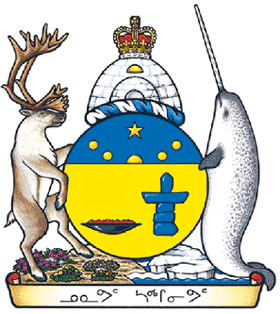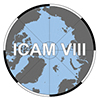|
|
|
|
|
|
|
|
Council on Earth Cryology, May 15-16, 2018 (Moscow, Russian Federation). Scientific council on Earth cryology of Russian Academy of Sciences together with Department of Geocryology of Faculty of Geology of Lomonosov Moscow State University, Institute of the Earth Cryosphere, the Tyumen Scientific Senter, Melnikov Permafrost Institute (Yakutsk) of the Siberian Branch of the Russian Academy of Science holds on May 15 - 16, 2018 an enlarged meeting with participation of the Russian and foreign scientists, engineers and experts: "Current problems of geocryology." The meeting of Scientific council on Earth Cryology of RAS has the status of the International meeting. The publication of materials in the collection of reports is planned. Submissions (Submission Form), offers on cooperation, support of a conference and papers (Sample of Paper) to e-mail: cryoconf18@gmail.com
2018 DOD Arctic Science & Technology Synchronization Workshop, May 16-18, 2018 (Hanover, NH). The 2018 Arctic Science & Technology Synchronization Workshop will be sponsored jointly by Northern American Aerospace (NORAD) US Northern Command (USNORTHCOM) and USD(R&E) to help represent Department of Defense-wide science and technology with Arctic relevance. The event organizers aim for in-depth discussions of military-relevant Arctic S&T and policy, and would like to emerge with a stronger sense of potential requirements for Arctic S&T work as well as strengthened connections for DOD communities, including operational communities, who work in Arctic conditions and conduct research related to them. In-person registration has reached its capacity and is closed.
|
Media
 Putin Decrees an Increase in Arctic Traffic. Putin Decrees an Increase in Arctic Traffic. President Vladimir Putin has issued a demand that the amount of traffic flowing through the Arctic Northern Sea Route reach a towering 80 million tons a year by 2024, a figure that exceeds even the most ambitious projections of his government's ministries. The decree was issued shortly after Putin's fourth inauguration as president after a March reelection campaign in which he was essentially unopposed. Bellona
Russian Nuclear-Powered Submarine Passes Through Arctic Ice. Video. The footage shows the nuclear-powered submarine passing near the Ruslan icebreaker. The K-535 Yuri Dolgoruky submarine is the leading sub of Project 955 Borey. The submarine is an element of the Russian nuclear triad: the Yuri Dolgoruky is armed with Bulava ballistic missiles. The submarine is 170 meters long and 13.5 meters wide. Pravda Report
How the History of the Roman Empire is Hidden in Arctic Ice. A group of researchers has gained an insight into the economy of the Roman empire, thanks to ancient polar ice. The research could tell historians much about the strength of the empire throughout history. An Arctic glacier would be the last place most people might think to look for Roman history, but glaciers hold a lot of information about our planet's past. In the Arctic, ice freezes but never thaws, so the contents of that ice are preserved for thousands of years. Popular Mechanics
 'Nunavut in Crisis:' Canadian Arctic Communities Plead for Resources to Deal with Growing Suicide and Violence. 'Nunavut in Crisis:' Canadian Arctic Communities Plead for Resources to Deal with Growing Suicide and Violence. Nunavut's health minister says more than one Arctic community is at a crisis point dealing with social problems. "We already have some letters crying out for more services," said Pat Angnakak, who said several hamlets have written her asking for special help. "It's not just Pangnirtung in a crisis. I think Nunavut is in a crisis." National Post
Using Microbes to Predict the Flow of Arctic Rivers. Arctic rivers like the Mackenzie transport vast amounts of freshwater to the sea. The rivers swell and diminish as glacial ice melts and freezes, changing ocean currents and altering Earth's climate. Yet rugged conditions can make it difficult to directly measure the discharge of remote rivers such as these-a major research gap. A new study proposes a novel approach to gauging river flow based on the microbes in the water. EOS
Test Program in Alaska Could Pave Way for Drones' Expanded Use in Health, Safety, Environment. Under a new federal initiative, Alaska will help pioneer expanded uses for drones, including remote delivery of medical devices and long-distance surveillance of the trans-Alaska pipeline. The Department of Transportation announced on Wednesday it chose the University of Alaska Fairbanks to be part of a test program to advance efforts to fully integrate drones into the nation's airspace. Anchorage Daily News
|
|
Future Events
** New this week **
This half-day program will focus on the capabilities of the EarthScope Transportable Array and the impact it is having on scientific research and operational monitoring in areas as diverse as earthquakes, weather forecasting, volcanoes, tsunamis, and ecosystems. The hosts are particularly interested in exploring inter-agency / multi-agency interests and opportunities for how the Transportable Array observing capability can be used, particularly with respect to the compatibility of different observing interests. The National Science Foundation has committed only to a short duration deployment but is open to broadening the application to other science observations for longer durations, if the obligation to remove the stations is shared or undertaken by other stakeholders.
- Addressing the energy field of the future;
- Defense energy systems in the North;
- Natural hazards and aerospace/defense;
- Empowering Alaska's entrepreneurs;
- Navigating the changing Arctic; and,
- Developing local and global energy solutions.
The Effects of Climate Change on the World's Oceans, June 4-8, 2018 (Washington, DC USA). The 4th International Symposium will bring together experts from around the world to better understand climate impacts on ocean ecosystems - and how to respond. The event is hosted by a variety of groups including International Council for the Exploration of the Sea (ICES), N. Pacific Marine Science Organization (PICES), Intergovernmental Oceanographic Commission of UNESCO (IOC), and Food and Agriculture Organization of the United Nations (FAO).
Vision on Marine Infrastructure, June 11, 2018, 1:00-3:00 pm (Washington, DC
).
The U.S. Committee on the Marine Transportation System and its Marine Transportation System Federal partners will share their visions and priorities on maritime infrastructure, which refers to physical infrastructure, informational infrastructure (such as aids to navigation, nautical charts, and real-time meteorological and oceanographic services), and mariner needs. Open to the public, but RSVP is required to access the location. Please contact Jaya.Ghosh@cmts.gov by June 6, 2018 to RSVP. See here for additional details.
 POLAR 2018, June 15-27, 2018 (Davos, Switzerland). POLAR2018 is a joint event from the Scientific Committee on Antarctic Research (SCAR) and the International Arctic Science Committee (IASC). The SCAR meetings, the ASSW and the Open Science Conference will be hosted by the Swiss Federal Institute for Forest, Snow and Landscape Research WSL under the patronage of the Swiss Committee on Polar and High Altitude Research. The WSL Institute for Snow and Avalanche Research SLF is organizing POLAR2018. POLAR 2018, June 15-27, 2018 (Davos, Switzerland). POLAR2018 is a joint event from the Scientific Committee on Antarctic Research (SCAR) and the International Arctic Science Committee (IASC). The SCAR meetings, the ASSW and the Open Science Conference will be hosted by the Swiss Federal Institute for Forest, Snow and Landscape Research WSL under the patronage of the Swiss Committee on Polar and High Altitude Research. The WSL Institute for Snow and Avalanche Research SLF is organizing POLAR2018.
From Entering the Field to Taking the Helm, Women's Perspectives on Polar Research, June 20, 2018 (Kongresszentrum Davos, Switzerland). This event is hosted by the Arctic Research Consortium of the United States. The US Arctic Research Commission (USARC) is one of the sponsors of this event. New research findings are shaping our understanding of the issues that women face in technical fields, particularly those with strong connections to fieldwork. Concerns include a deficit of female leadership due to the so-called "leaky pipeline" (e.g., Goulden et al., 2011), a lack of safety and inclusivity at field locations (Clancy et al., 2014; Nelson et al., 2017), and explorations of ways in which research agendas have discounted contributions of women (e.g., Carey et al. 2016). In spite of historical barriers to participation in polar field work, women have made outstanding contributions to polar physical, biological and social sciences, as well as to community-level efforts to coordinate and communicate science. In the past decade, women have stepped into leadership roles at polar institutions. Yet evidence of persistent challenges, reflected both in academic studies and media reports (see Further Resources), compels us to examine the sources of those challenges and to explore solutions to ensure a bright future for all those who wish to engage in polar research.
5th European Conference on Permafrost, June 23-July 1, 2018 (Chamonix-Mont Blanc, France). In the continuation of the International and Regional conferences convened by the International Permafrost Association, the 5th European Conference on Permafrost (EUCOP 2018) will be held in Chamonix-Mont Blanc, France, 23rd June - 1st July 2018. The conference aims at covering all relevant aspects of permafrost research, engineering and outreach on a global and regional level. Conference website: here.
Arctic Observing Summit 2018, June 24-26, 2018 (Davos, Switzerland). The Arctic Observing Summit (AOS) is a high-level biennial summit that provides a platform to address urgent and broadly recognized needs of Arctic observing across all components of the Arctic system. AOS 2018 will be held in Davos, Switzerland ( June 24-26) and will focus on pressing issues in the implementation and support of sustained observations that can be addressed through a business-case lens. To that end, short submissions are requested that address any and all aspects of the overarching theme and sub-themes. Additional information can be found here.
17th International Congress of Circumpolar Health (ICCH17), August 12-15, 2018 (Copenhagen, Denmark). The ICCH congresses are held every third year in different locations in the circumpolar area and represent the largest scientific meetings worldwide on circumpolar health. The ICCH congresses serve as the primary source of information exchange and scholarly communication in issues relating to circumpolar health. More than 750 participants generally register and participate in each Congress, and more than 400 scientific papers or posters are usually presented.
UArctic Congress 2018, September 3-7, 2018 (Oulu and Helsinki, Finland).
The UArctic Congress 2018 will bring together key UArctic meetings and a science conference into one single gathering, including business meetings of the Council of UArctic, Rectors' Forum, Student Forum, and Thematic Networks & UArctic Institutes Leadership Team. The Congress is an integral part of the Finland's Arctic Council chairmanship program, and open to the public. The event will highlight the themes and priorities of the Finnish chairmanship, including the goals of the United Nations' 2030 Agenda for Sustainable Development, and the Paris Agreement under the UN Framework Convention on Climate Change.
Scientific Exploration of the Arctic and North Pacific (SEA-NorP), September 25-27, 2018 (Mt. Hood, Oregon USA). This workshop will include discussion of hypotheses that can be tested by scientific drilling in the region, the technology necessary to achieve those goals, ideal sites for drilling based on existing data, and where additional site survey data is needed. The goal of the workshop organizers is that multiple proposals will be initiated at the workshop, both for full cruise legs and for shorter, targeted expeditions around the following themes: ocean gateways, geohazards, volatile cycling, ice histories at transition zones, biosphere and climate.
The second Arctic Biodiversity Congress is hosted by the Conservation of Arctic Flora and Fauna (CAFF), the biodiversity working group of the Arctic Council, and the Ministry of the Environment, Finland. The second Arctic Biodiversity Congress will build on the success of the first Congress, held in 2014 in Trondheim, Norway, and will bring together scientists, policymakers government officials, Indigenous representatives, Traditional Knowledge holders, industry, non-governmental organizations, and others to promote the conservation and sustainable use of Arctic biodiversity.
|
|

  
4350 N. Fairfax Drive, Suite 510
Arlington, VA 22203, USA
External links in this publication, and on the USARC's World Wide Web site ( www.arctic.gov) do not constitute endorsement by the US Arctic Research Commission of external Web sites or the information, products or services contained therein. For other than authorized activities, the USARC does not exercise any editorial control over the information you may find at these locations. These links are provided consistent with the stated purpose of this newsletter and the USARC Web site.
|
|
|
|
|
|
|
|
|
 Putin Decrees an Increase in Arctic Traffic. President Vladimir Putin has issued a demand that the amount of traffic flowing through the Arctic Northern Sea Route reach a towering 80 million tons a year by 2024, a figure that exceeds even the most ambitious projections of his government's ministries. The decree was issued shortly after Putin's fourth inauguration as president after a March reelection campaign in which he was essentially unopposed. Bellona
Putin Decrees an Increase in Arctic Traffic. President Vladimir Putin has issued a demand that the amount of traffic flowing through the Arctic Northern Sea Route reach a towering 80 million tons a year by 2024, a figure that exceeds even the most ambitious projections of his government's ministries. The decree was issued shortly after Putin's fourth inauguration as president after a March reelection campaign in which he was essentially unopposed. Bellona 'Nunavut in Crisis:' Canadian Arctic Communities Plead for Resources to Deal with Growing Suicide and Violence. Nunavut's health minister says more than one Arctic community is at a crisis point dealing with social problems. "We already have some letters crying out for more services," said Pat Angnakak, who said several hamlets have written her asking for special help. "It's not just Pangnirtung in a crisis. I think Nunavut is in a crisis." National Post
'Nunavut in Crisis:' Canadian Arctic Communities Plead for Resources to Deal with Growing Suicide and Violence. Nunavut's health minister says more than one Arctic community is at a crisis point dealing with social problems. "We already have some letters crying out for more services," said Pat Angnakak, who said several hamlets have written her asking for special help. "It's not just Pangnirtung in a crisis. I think Nunavut is in a crisis." National Post


